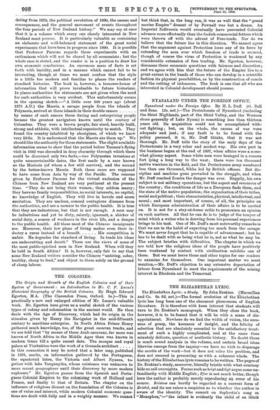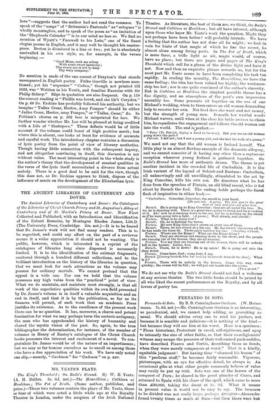a feeling that the author has not done all he
; we look in vain for hints of that magic of which ho has the secret, he almost alone among living poets. In The Pot of Broth, which is mere farce, a trifle light as air, magic would, of course, have no place; but there are pages and pages of The King's Threshold which call for a gleans of the divine light and have it not. Now and then an exquisite phrase rewards us, but for the most part Mr. Yeats seems to have been completing Ilia task too rapidly. In reading the morality, The Hour-Glass, we have the same feeling ; the idea has been valued too highly, the worknum- ship too low ; nor is one quite convinced of the author's sincerity. But in Cathleen sot Houlihan the simplest possible theme has a fine dignity, and an atmosphere of the poet's own impressive unreality too. Some peasants sit together on the eve of one Michael's wedding, when to them enters an old woman demanding help to recover her own. Not food does she want and not money, but the strength of young men. Beneath her wistful words Michael wavers, until when at the close Isis bride arrives to claim him, he repudiates the engagement and foliates the old woman out into the world. The end isperfect "Peter [To Patrick, laying a hand on his arm]. Did you see an old warn= going down the path P
Patrick, I did sot; but I saw a young girl, aud she had the walk of a queen."
We need not say that the old woman is Ireland herself. The little play is an almost flawless example of the dramatic allegory, and we cannot conceive of it having any other than a rapturous reception wherever young Ireland is gathered together. On Baile's Strand has more of authentic drama. The theme is yet another incident in the crowded life of Cuelsullain. It is the Irish variant of the legend of Sohrab and Ruststm: Cuchullain, all unknowingly and all unwillingly, stimulated to the act by King Concobar, kills his own son. He discovers what be has done from the speeches of Pistols, an old blind rascal, who is led about by Barach the fool. Tho ending holds perhaps the finest flash of inspiration in either book
Concobar, Concobar, the sword in yens heart.
Barash. He is going up to Ring Concebar; they are all under the true. lib, no hole standing still. There is a great ware going to break and he is looking at it. Alit now he is rimming down to the sea, but he is holding up hie eword aa it he were going into a fight. [A pew.] Well Amick, well etruak Fintain. What is he doing sow?
Barach. Oh, he hi fighting the Caere. Fintain. He se. Zing Goncobar's crown on every use of them.
Barash. There, he has struck at a big one. lie has struck the crown off It, he km made the foam fly. Thom again auother big ens. [Sh aiding without, Fintain. Where tire the Kings? What are the Kings doing?
meg are shouting and running down to the shore, and the people are running out of the houses, they are all running. Pintain. You my they are running out of the houses, there will be nobody left lathe houses. Listen, fool.
Barash. There, he is down! lice up again! Hots going out Into the deep water. Pintain. Come here, fool ; come here, I say.
Barash [Coming towards him tel Loolang baciatards towards the door]. What i'Piitn?tain. There will be nobody in the houses. Como this way, come quickly; the ovene will be full; we will put our hands into the ovene.
'Good Muse, reek roe asleep With some sweet harmony ; The weary eye is not to keep Thy wary company."
No mention is made of the one sonnet of Drayton's that stands unsurpassed in English poetry. Pulke Greville is nowhere men- tioned; yet his "sequence" " thence," though not printed till 1633, was "Written in his Youth, and familiar Exercise with Sir Philip Sidney." Slips in quotation are also frequent. On p. 118 the correct reading is "Phillis was loved, and she lik't Corydon." On p. 68 Dr. Erskine has probably followed his authority, but we imagine "Pollee Cesar, Hector, Ausy Pompee" should be either "Julles Cesar, Hector, ausy Pompee," or " Tulles, Cesar," &c. In Politian's chorus on p. 262 here is misprinted for here. We further wonder whether Mr. Leo will be pleased at being credited with a Life of " Shakspere." These defects would be of little account if the volume could boast of high positive merit ; but where this is absent, one looks at least for evidence of accurate and careful work. The introductory chapter contains a discussion of lyric poetry from the point of view of literary aesthetics. Though having little connection with the subsequent inquiry, and not altogether convincing in itself, this discussion is not without value. The most interesting point in the whole study is the author's theory that the development of musical qualities in the verse of the lyric itself necessitated a divorce from actual melody. There is a good deal to be said for the view, though this does not, as Dr. Erskine appears to think, dispose of the influence of music on the development of the Elizabethan lyric.
TITE ANCIENT LIBRARIES OF CANTERBURY AND DOVER,



























































 Previous page
Previous page